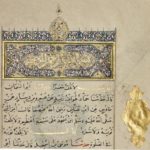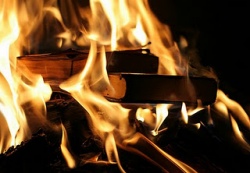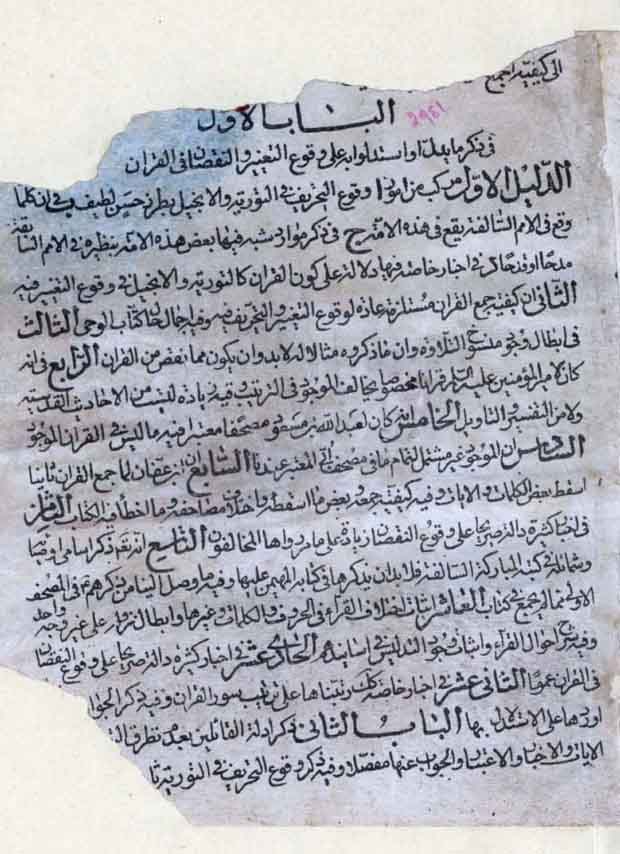Not all of the Qur’ān was collated during the life of the Prophet. In fact the Qur’ān was originally not collated at all. Some believe that the Prophet was unaware of the day when he would die and death caught up with him unawares. For this reason he did not organise its collection before his death. Some are of the opinion that the reason for this is that the copyist was waiting for the Prophet’s changing of his directives, and so was looking out for the last legal directive before collating it.
OTHERS GO FURTHER and consider that the Qur’ān was intended to be sacralised by its preservation in the memory, so that they learnt the verses by heart rather than writing out line by line as a book, on the consideration that memory and oral tradition were superior to writing and recording. For this and other reasons the Prophet did not collate the Qur’ān during his lifetime. This led to the major problem of collating the Qur’ān, to the plurality of Qur’ānic texts and the burning of many of them.
This was in addition to the claims made as to its suffering major distortions following the wars of the first caliph Abū Bakr and the death of a large number of Companions and memorisers of the Qur’ān, particularly after the events in al-Yamāma and which are termed the Apostasy Wars – that is when some Muslims apostatised from Islam after the death of Muhammad, since it was his personality that was uniting the various tribes that had been in conflict with each other. On his death they seceded from Islam.
This also explains the difference concerning the major authority after him, claimed by the Sunnis to be invested in the caliphs and by the Shīʽa in the imamate following the death of a large number of the Companions and the memorisers of the Qur’ān. The situation was so grave that ‘Umar ibn al-Khattāb enquired about certain Qur’ānic verses and was told and they were recited by so-and-so who had died at al-Yamāma, ‘Umar ibn al-Khattāb then went angrily to the first caliph Abū Bakr demanding that he collect the Qur’ān together:
“Qur’ān reciters have been slain and I fear that more Qur’ān reciters will be killed and much of the Qur’ān lost, so I see that you should order the collation of the Qur’ān”.
However the caliph Abū Bakr hesitated arguing “how should I undertake a work that the messenger of God himself did not undertake during his life?” To which ‘Umar replied: “it is nonetheless a good thing to do”. Thus he began to turn over the issue in his mind before finally accepting to order the collation of the Qur’ān.
Abū Bakr summoned Zayd ibn Thābit and requested that he himself collate the Qur’ān, given that he was a youth known for his sincerity, his reliability and for his powers of memory, and also that the messenger had entrusted him with writing down some of the Qur’anic verses. But he also hesitated since the command had not been given by the messenger himself and nor had he ever been instructed to do so. And how could he undertake such a difficult task: “Were I entrusted with collecting a mountain”, he said, “it would be an easier matter than collating the entire Qur’ān”. But Abū Bakr insisted until he accepted the task.
There was no consensus or continuity in the collation of the Qur’ān
Zayd was faced with many difficulties, having to handle writings made by some on animal skins, clothing fragments and pieces of stone, rock, palm fronds and bones and what have you, and even the vagaries of men’s memories. He used to request two evidences for the verses to vouch for their soundness, but did not always find them. For instance, Zayd found the end of the sūrat al-Tawba [Qur’ān IX] only preserved by Abū Khuzayma al-Ansārī but nevertheless confirmed it in his copy, while ‘Umar claimed the existence of the ‘verse of the Stone’ – If an adult male and female commit adultery then most surely ye must stone them to death – while no witness could be found to vouch for its soundness or declare for having heard the Prophet say this. Accordingly, this verse Zayd did not include in his copy.
In this way Zayd collated the text into one copy that remained with Abū Bakr. As for other Companions of the Prophet they have other copies that differ with it, such as the copy of ‘Ali ibn Abī Tālib’s copy who contrived to remain in his house for six months following the death of the Prophet without attending Friday prayer so as to collate the Qur’ān himself into a volume. That copy differs considerably from Zayd’s copy … There was thus no consensus or continuity at all in the collation of the Qur’ān into one volume, rather there was a plurality of copies after the Prophet’s death.
After the death of Abū Bakr ‘Umar ibn al-Khattāb obtained Zayd’s copy and this remained with him whilst he was occupied with wars and conquests – to the point that he did not distribute the copy or have any copies made from it. He gave instructions that after his death a copy of Zayd’s volume should be entrusted to his daughter Hafsa (the wife of the Prophet Muhammad) and it duly remained with her. Following the accession of ‘Uthmān ibn ‘Affān to the caliphate Hudhayfa ibn al-Yamān found that Qur’anic verses and readings differed between Iraq and Syria and elsewhere, and said: “O ‘Uthmān, save this Nation before there is a difference as to the Qur’ān, its verses and its readings!”
Whereupon he requested Hafsa to send him Zayd’s copy. She, however, refused to
do so. ‘Uthmān then convened a new committee concerned with writing down the Qur’ān, made up of Zayd ibn Thābit, ‘Abd Allāh ibn Zubayr, Saʽīd ibn al-ʽĀs and ‘Abd al-Rahmān ibn al-Hārith ibn Hisham to collate the Qur’ān, instructing them that when there was a difference with Zayd they should consult the Qurayshis since the Qur’ān had been sent down in their dialect and language. Since there were very many problems ‘Uthmān insisted finally that they should reconcile his version with that of Hafsa, she reluctantly accepted this on condition that he should return it to her. But he found the version to differ greatly from the one he had and so had Hafsa’s version burnt. Hafsa was greatly angered by this since she now had lost her copy.
‘Uthmān went on to instruct all Muslims in possession of a copy of the Text to bring them to him, and whenever he saw divergent copies he ordered them all to be burnt. Some, however, who possessed copies that differed from ‘Uthmān’s copy, and who did not wish that it should be burnt and destroyed, escaped the clutches of ‘Uthmān. These included ‘Abd Allāh ibn Masʽūd and ‘Abd Allāh ibn Abī and others, in addition to the version of ‘Ali ibn Abī Tālib which differs greatly from it.
The four great hadith collections are all in agreement as to the corruption of the Qur’ānic text
This is one of the great problematic areas in the issue of the burning of the divergent Qur’āns, in that were it not for the appearance of copies and their divergences there would have been no burning of Qur’ān texts in the era of ‘Uthmān. There was another problem concerning this caliph: how is it that the words of God – divine words – can be permitted to be burnt in fire? Also, ‘Uthmān had several copies made of his versions and sent to Syria, Makka, Basra, Kufa and Bahrayn, yet the copy of ‘Ali ibn Abī Tālib differs greatly from this copy, and the Shīʽa believe that ‘Alī had passed this copy onto his son Hasan, and then to Husayn and so on and so forth, until it reached the Awaited Mahdī to be revealed as a new, different Qur’ān at the end of times.
In the work al-Kāfī by al-Kulaynī (one of the most important Shīʽa sources on hadith) Hishām ibn Sālim states, on the authority of Abū ‘Abd Allāh (the Imam Jaʽfar al-Sādiq), that the Qur’ān communicated to Muhammad by the angel Gabriel consisted of 17,000 verses[1], that is, three times the size of the Qur’ān in existence and circulated at present.

Suggested Reading
The four great hadith collections (al-Kāfī, al-Faqīh, al-Istibsār and al-Tahdhīb) are all in agreement as to the corruption of the Qur’ānic text, and Shīʽites have authored a number of works on this distortion, the most important being the work by the hadith scholar Nūrī al-Hamdānī: Fasl al-Khitāb fī Tahrīf Kitāb Rabb al-Arbāb (‘Summary on the Textual Corruption of the Book of the Lord of Lords’). In this work he collected together over two thousand hadith from imams of the Ahl al-Bayt concerning distortions of the Qur’ān, including some sūras that suffer major omissions, whereby the sūrat al-Ahzāb was larger than the sūrat al-Baqara, and many other examples.[2]
The method of collation followed by the Qur’ān-reciters in the era of Abū Bakr and ‘Uthmān and subsequently the burning of divergent texts in ‘Uthmān’s era give evidence of the multiplicity of Qur’ān texts and the divergences that existed between them.
[1] Usūl al-Kāfī, Part II, ‘Fadl al-Qur’ān’.
[2] In the present Text, the sūrat al-Baqara has 286 verses, while sūrat al-Ahzāb only 73. (Ed.)


